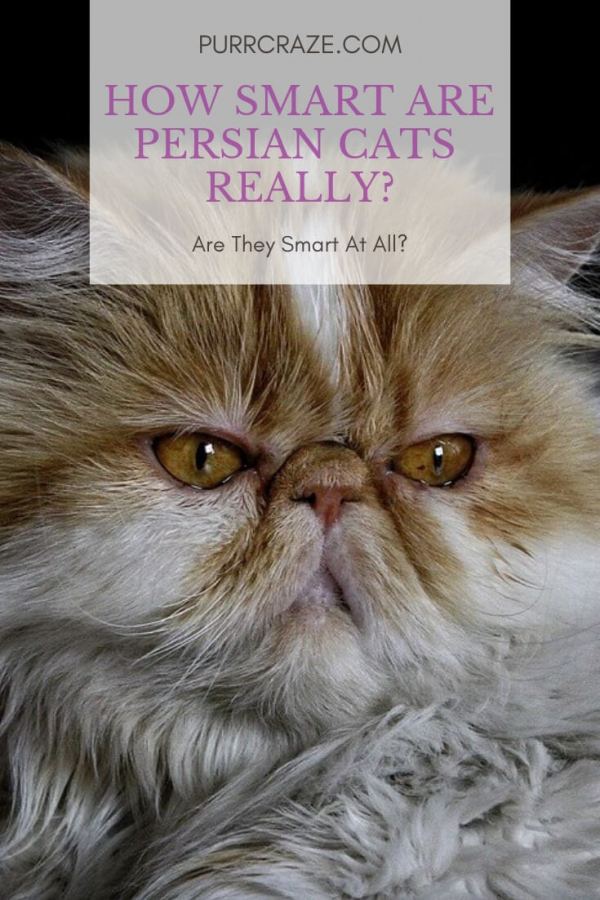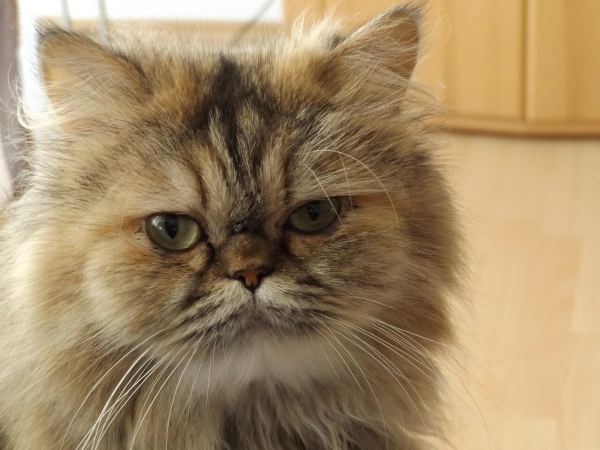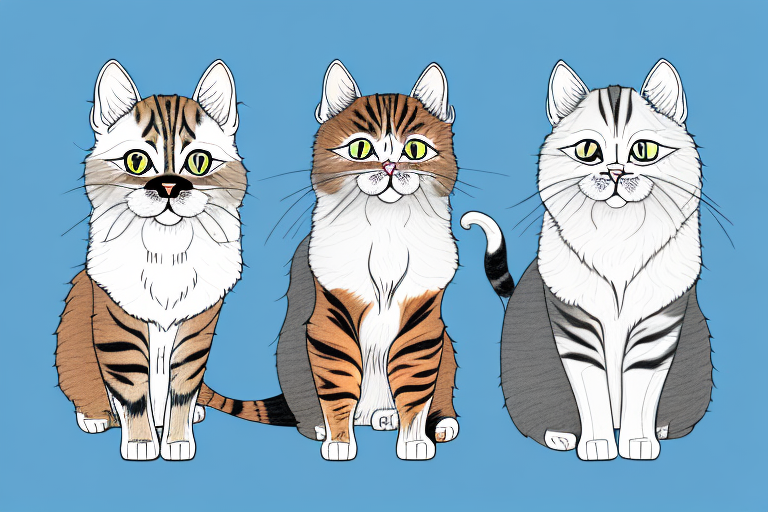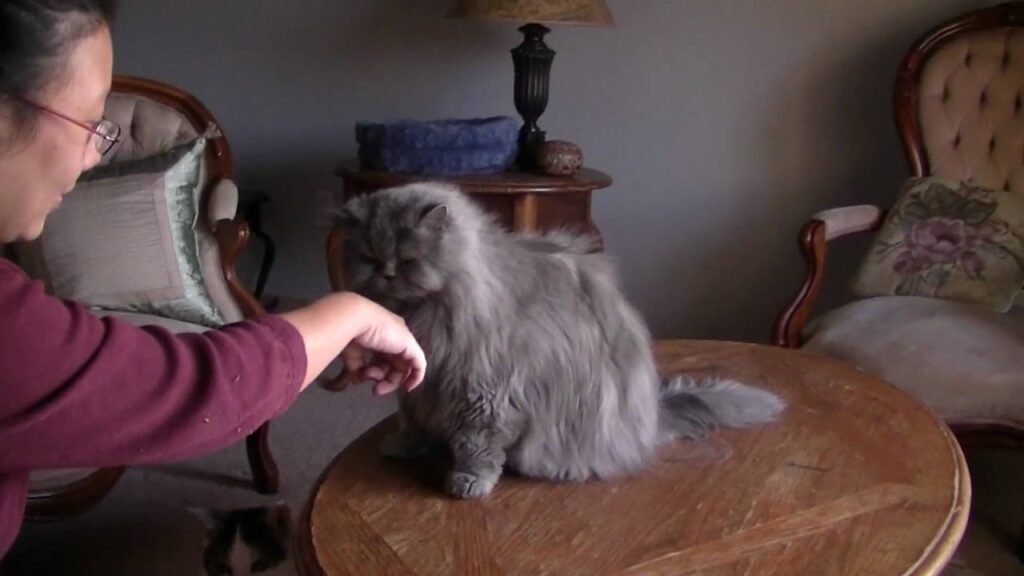Have you ever wondered about the intelligence level of Persian cats? Well, let me tell you, these fluffy felines are known for their charm and beauty, but what about their brains? In this article, we’ll explore the topic of Persian cats and their intelligence level in detail.
Persian cats are not typically considered the Einstein’s of the feline world, but that doesn’t mean they’re lacking in intelligence. These cats may not be the quickest learners, but they make up for it with their calm and gentle nature. They are known for their ability to adapt well to different environments and can be quite independent. However, don’t be fooled by their laid-back demeanor, as they are also known to be quite observant and can quickly pick up on routines and patterns. So, if you’re looking for a furry friend who is both beautiful and intelligent in their own unique way, a Persian cat might just be the perfect choice for you.
In this article, we’ll delve into the various aspects of Persian cat intelligence, exploring their problem-solving abilities, trainability, and their overall understanding of human behavior. We’ll provide you with interesting insights and reliable information to give you a better understanding of these adorable creatures. So, if you’re as curious as we are about the intelligence level of Persian cats, stay tuned for more details in our upcoming articles on PersianCatDude.com!
Persian Cats and Their Intelligence Level

Overview of Persian Cats
The Persian cat is known for its luxurious and beautiful coat, expressive eyes, and gentle demeanor. It is one of the oldest and most popular cat breeds, renowned for its distinctive appearance and calm temperament. In this article, we will delve into the intelligence level of Persian cats and explore various aspects related to their behavior, trainability, social interactions, cognitive abilities, and more.
Appearance and Characteristics
Persian cats are medium to large-sized cats with a solid and muscular build. They have a broad and round head, a short and broad nose, and large round eyes that can come in various colors. Their coat is long, dense, and silky, and it requires regular grooming to maintain its beauty. Persian cats also have a sweet and gentle expression, which adds to their overall allure.

History and Origins
The origins of the Persian cat can be traced back to ancient Persia, now modern-day Iran. These cats were highly revered and cherished by Persian nobles and royalty. They were considered a symbol of luxury and elegance, often depicted in paintings and art of the time. During the 19th century, British traders brought Persian cats to Europe, where they quickly gained popularity and became a favorite among cat enthusiasts.
Popularity and Breeds
Persian cats are undeniably one of the most popular cat breeds worldwide. Their regal appearance, calm temperament, and affectionate nature make them a beloved choice for many cat lovers. Over the years, several different breeds have been developed from the Persian cat, each with its own unique characteristics and traits. These include the Himalayan, Exotic Shorthair, Chinchilla Persian, and several others.

Intelligence Level of Persian Cats
Understanding Persian Cat Intelligence
While Persian cats may not be known for their exceptional intelligence like some other cat breeds, they possess their own unique forms of intelligence. Their intelligence lies more in their ability to adapt to their surroundings and understand the emotions and needs of their human companions. They may not excel in problem-solving tasks or be as quick to learn tricks, but they make up for it with their gentle and affectionate nature.
Intelligence Scale and Comparisons
When assessing the intelligence of Persian cats, it’s important to remember that intelligence can vary greatly among individuals, regardless of breed. While some Persian cats may be more quick-witted and clever, others may exhibit more laid-back and independent traits. It’s essential to appreciate the unique intelligence of each cat, rather than comparing them to other breeds or standards.
Factors Influencing Intelligence
Several factors can influence the intelligence level of Persian cats. Genetics play a role, as certain bloodlines may exhibit higher intelligence traits. Additionally, early socialization and environmental enrichment during kittenhood can contribute to a cat’s overall intelligence and cognitive development. Regular mental stimulation and interaction with their human companions can also enhance their intelligence and problem-solving abilities.
Observations and Studies
While there may not be extensive scientific studies specifically focused on Persian cat intelligence, anecdotal evidence and observations from cat owners and experts provide valuable insights. Many Persian cat owners report that their cats possess a deep understanding of their emotions and often exhibit empathetic behavior. Despite not being natural performers of tricks, Persian cats excel in forming strong bonds with their human companions.
Behavioral Traits
Temperament
Persian cats are well-known for their calm and gentle temperament. They tend to be laid-back and enjoy a serene and peaceful environment. They are generally not as active or playful as some other cat breeds but prefer to spend their time lounging and enjoying their surroundings. Persian cats are also known for their sweet and loving nature, making them excellent companions and therapy cats.
Communication Skills
Like all cats, Persian cats have their unique ways of communicating with their human companions. They may use vocalizations such as meowing, purring, and chirping to convey their needs, desires, or to seek attention. Persian cats are also masters of body language, using their tail, ears, and eyes to express their emotions. Understanding and interpreting these communication cues is essential in fostering a strong bond with them.
Problem-solving Abilities
Persian cats may not excel in problem-solving tasks compared to some highly intelligent breeds, but they possess their own distinct problem-solving abilities. They are often skilled at finding cozy and comfortable spots to lounge or hide, and they can navigate their environment with grace and precision. While they may not be as active in seeking out mental challenges, they are experts at making their human companions feel loved and cherished.

Trainability of Persian Cats
Methods and Techniques for Training
Training Persian cats requires patience, consistency, and positive reinforcement. They respond well to gentle and reward-based training methods, where they are praised and rewarded for desired behaviors. Avoid using punishment or harsh training techniques, as it can be detrimental to their sensitive nature. Consistency in training and providing clear cues and commands will help Persian cats understand what is expected of them.
Teaching Tricks and Commands
While Persian cats may not be as eager to learn tricks as some other breeds, it is still possible to train them to perform simple commands and behaviors. Start with basic commands such as “sit” or “come” and gradually build from there. Use treats or affectionate praise as rewards for their efforts. Remember to keep training sessions short and enjoyable, as Persian cats may lose interest if training becomes too repetitive or lengthy.
Challenges and Tips for Training
Training Persian cats can pose some challenges due to their independent nature and sometimes stubborn demeanor. They may require more time and patience to grasp new commands or behaviors compared to more naturally obedient breeds. To overcome these challenges, break training into small and manageable steps, offer plenty of rewards and positive reinforcement, and keep training sessions engaging and fun. Consistency and repetition are key to success.
Social Interactions
Bonding with Humans
Persian cats are renowned for their strong bonds and affectionate nature towards their human companions. They thrive on love, attention, and physical touch. Taking the time to build a deep bond with a Persian cat is essential for their overall well-being. Regular grooming sessions, cuddling, and playtime will foster a strong and loving connection between you and your feline friend.
Interaction with Other Pets
Persian cats generally get along well with other pets, particularly if they are introduced to them at a young age. They have a gentle and non-confrontational nature and are more likely to avoid or retreat from conflict rather than engage in it. However, as with any pet, it is important to monitor their interactions and ensure that all animals feel safe and comfortable in their shared environment.
Relationship with Children
Persian cats can form close and loving relationships with children. Their calm demeanor and gentle nature make them well-suited for households with kids. However, it is essential to teach children how to interact respectfully and gently with cats to avoid accidental harm. Supervision is crucial, especially for younger children, to ensure that both the child and the cat are safe during their interactions.
Cognitive Abilities
Memory and Learning Capacity
Persian cats possess a good memory and learning capacity, particularly when it comes to recognizing their human companions and their daily routines. They remember the layout of their environment, including their favorite lounging spots and hiding places. While they may not excel in learning complex tricks or tasks, they can quickly adapt to changes in their surroundings and form strong bonds with their families.
Problem-solving and Adaptability
Persian cats exhibit good problem-solving abilities when it comes to navigating their environment and finding comfortable resting spots. They are adaptable and can easily adjust to changes in their surroundings, such as moving to a new home or welcoming new family members. Persian cats are known for their ability to make themselves comfortable anywhere, whether it’s finding the perfect sunbeam or curling up on a cozy blanket.
Perception and Sensory Skills
Persian cats have excellent perception and sensory skills, particularly when it comes to vision and hearing. Their large round eyes provide them with a wide field of view, and their keen hearing allows them to detect even the slightest sounds. These heightened senses enable them to be aware of their surroundings and respond to stimuli efficiently. Their sensitivity to their human companions’ emotions also highlights their perceptive abilities.
Playfulness and Enrichment
Favorite Toys and Playtime Activities
While Persian cats may not be as playful and energetic as some other breeds, they still enjoy playtime and interaction with their human companions. Their favorite toys often include soft and plush items they can bat around, interactive puzzle toys that stimulate their mind, and toys that mimic their natural hunting instincts, such as feathers on a string. Engaging in play sessions with your Persian cat will keep them mentally stimulated and physically active.
Mental Stimulation and Puzzle Toys
Providing mental stimulation is essential for the well-being and intellect of Persian cats. Puzzle toys that challenge their problem-solving abilities, treat-dispensing toys, and interactive toys that engage their curiosity are excellent choices. These toys keep them entertained and prevent boredom, which can lead to destructive or problematic behaviors. Regular rotation of toys and introducing new ones will keep their interest piqued.
Creating an Enriched Environment
Creating an enriched environment is vital for Persian cats to thrive intellectually and emotionally. Provide ample opportunities for climbing, scratching, and exploring their surroundings. Make sure there are cozy resting spots where they can observe their domain comfortably. Consider incorporating window perches or cat trees for an elevated view of the outside world. Interactive toys, puzzles, and regular play and cuddle sessions will further enrich their environment.
Emotional Intelligence
Understanding Emotions in Cats
Persian cats, like all felines, experience a range of emotions. They can feel joy, fear, sadness, and contentment, among others. Recognizing and understanding their emotional cues is crucial for nurturing a strong bond with them. Pay attention to their body language, vocalizations, and changes in behavior to gauge their emotions accurately. Responding to their emotional needs with love and care will strengthen your relationship.
Empathy and Bonding
Persian cats are highly empathetic creatures, often sensing the emotions of their human companions. They have an innate ability to provide comfort and solace during times of stress or sadness. Persian cats thrive on forming deep bonds with their families and are known to offer warmth and support when needed. Their intuitive nature makes them excellent emotional companions.
Expressions of Affection
Persian cats are affectionate and love to express their affection towards their human companions. They may curl up in your lap, nudge you with their head, or purr contentedly when being stroked. Some Persian cats may also engage in gentle kneading behavior, a throwback to their kittenhood when they would knead their mother’s belly for comfort. Recognizing and reciprocating their expressions of affection strengthens the bond between you and your Persian cat.
Problematic Behaviors
Aggression and Dominance Issues
While Persian cats are generally known for their calm and peaceful nature, some individuals may exhibit aggression or dominance issues. This can be due to various factors, such as improper socialization, fear, or a lack of mental and physical stimulation. Addressing these issues requires patience and seeking guidance from a professional behaviorist if necessary. Positive reinforcement and creating a safe environment will help manage and correct these behaviors.
Separation Anxiety
Like many cats, Persian cats can experience separation anxiety when separated from their human companions for extended periods. Signs of separation anxiety may include excessive meowing, destructive behavior, litter box issues, or withdrawal. To minimize separation anxiety, gradually acclimate your cat to alone time, provide stimulating toys or puzzles, and ensure they have a cozy and safe environment when you are away.
Litter Box Problems
Occasionally, Persian cats may develop litter box problems, such as urinating or defecating outside of the litter box. This can be due to various factors, including medical issues, stress, or litter box cleanliness. It is crucial to rule out any underlying medical conditions and ensure that the litter box is kept clean and accessible. Providing multiple litter boxes in different areas of the house can also help prevent litter box problems.
Health and Intelligence
Genetic Factors
Genetics can play a role in a Persian cat’s overall health and intelligence. Responsible breeders prioritize breeding from healthy and genetically sound lines, reducing the chances of inherited health issues. Opting for a reputable breeder who conducts thorough health testing can increase the likelihood of acquiring a Persian cat with good overall health and potentially enhanced intelligence.
Common Health Issues
Like all cat breeds, Persian cats are prone to certain health issues. Some common health problems observed in Persian cats include respiratory issues, eye conditions such as tears duct obstruction and eye drainage, dental problems, and polycystic kidney disease. Regular veterinary check-ups, a balanced diet, and proper grooming practices are essential for maintaining their health.
Impact on Intelligence
While health issues can impact a Persian cat’s overall well-being and quality of life, the impact on their intelligence level is not significant. Persian cats can still lead happy and fulfilling lives despite any health challenges they may face. With proper care, love, and attention, Persian cats can thrive intellectually, forming deep bonds with their human companions and providing endless joy.
Tips for Enhancing Intelligence
Mental Stimulation Exercises
Engaging Persian cats in regular mental stimulation exercises is vital to enhance their intelligence. Create treasure hunts by hiding treats or toys around the house, offering puzzle toys that require problem-solving skills, or teaching them simple obedience commands. Keep these exercises short and enjoyable to maintain their interest and prevent frustration.
Interactive Toys and Games
Interactive toys that require interaction and problem-solving, such as treat-dispensing toys or puzzle games, are excellent choices to enhance a Persian cat’s intelligence. These toys engage their curiosity and stimulate their minds, preventing boredom and encouraging exploration. Rotate the toys regularly to keep their interest piqued.
Training Strategies
While training Persian cats can be a bit challenging due to their independent nature, implementing effective training strategies can enhance their intelligence. Use positive reinforcement techniques, such as rewarding desired behaviors with treats or affectionate praise. Break training sessions into short and manageable steps, gradually building on their skills and knowledge. Consistency and patience are key to successful training.
Persian Cats in Popular Culture
Persian Cats in Movies and TV Shows
Persian cats have made appearances in various movies and TV shows, often portrayed as elegant and regal characters. Films such as “The Aristocats” and “That Darn Cat!” feature Persian cats as part of their cast. In TV shows like “Friends,” Rachel’s character famously owned a Persian cat named Mrs. Whiskerson. These appearances have further contributed to the popularity and recognition of the breed.
Art and Literature
Persian cats have inspired many artists and writers throughout history. Their unparalleled beauty and majestic presence make them a favorite subject for painters, photographers, and sculptors. Additionally, Persian cats have been featured prominently in literature, with notable mentions in books such as T.S. Eliot’s “Old Possum’s Book of Practical Cats” and Edgar Allan Poe’s “The Black Cat.”
Celebrities and Persian Cats
Persian cats have also gained popularity and recognition through their association with celebrities. Famous personalities such as Salvador Dali and Elizabeth Taylor were known for their love of Persian cats. Taylor’s cat, Puff, even appeared alongside her in a commercial for White Diamonds perfume. These high-profile endorsements have further cemented the Persian cat’s status as an iconic and beloved breed.
Myths and Misconceptions
Are Persian Cats Dumb?
One prevalent misconception about Persian cats is that they are not intelligent or are considered “dumb” compared to other breeds. While Persian cats may not possess the same problem-solving abilities or eagerness to learn tricks as some other breeds, they have their own unique intelligence. Their attentive and empathetic nature, combined with their ability to form strong bonds with their human companions, showcases their distinct form of intelligence.
The Influence of Stereotypes
Like any breed, Persian cats have been subject to stereotypes that do not accurately represent their true nature. These stereotypes often stem from limited knowledge or understanding of the breed and can perpetuate misinformation. It is essential to approach these stereotypes with an open mind and recognize that each Persian cat is an individual with their own unique personality and traits.
Debunking Myths
Debunking myths surrounding Persian cats requires spreading accurate information and educating others about the breed. Sharing their unique qualities, intelligence, and ability to form deep emotional connections can help dispel misconceptions. Encouraging firsthand experiences and interactions with Persian cats can also showcase their true nature and intelligence.
Conclusion
Persian cats are not only known for their stunning appearance but also for their exceptional intelligence in their own distinctive ways. While they may not excel in problem-solving tasks or show off with a repertoire of tricks, their ability to form deep emotional connections, understand their human companions’ emotions, and adapt to their surroundings showcases their unique form of intelligence. By providing mental stimulation, creating a nurturing environment, and building a strong bond, you can further enhance the intelligence of your Persian cat and enjoy a fulfilling companionship for years to come.